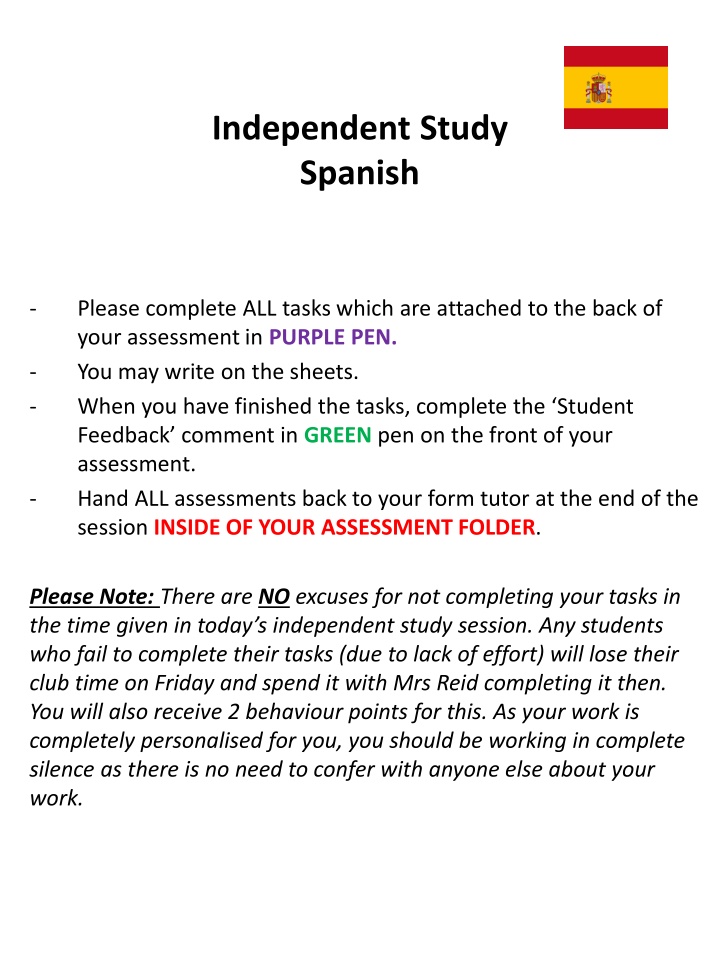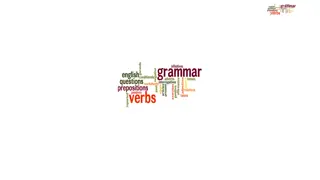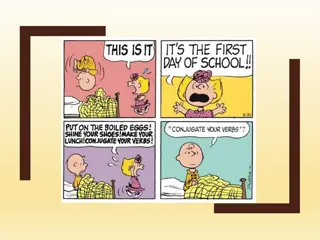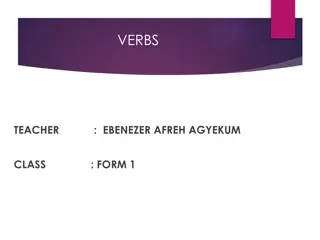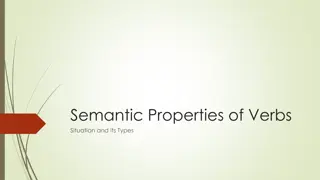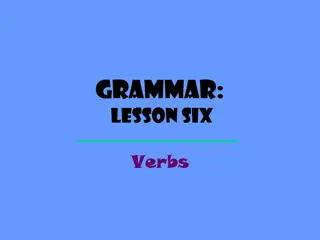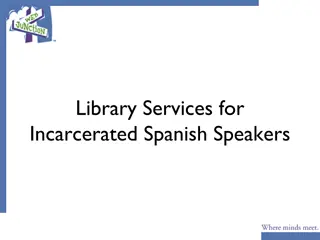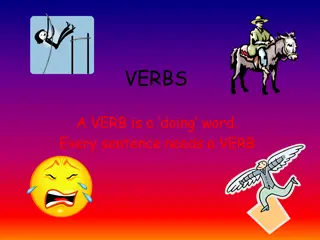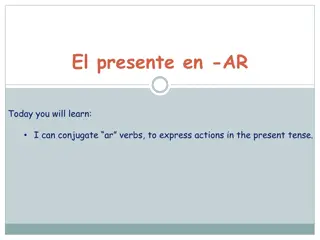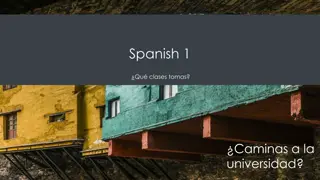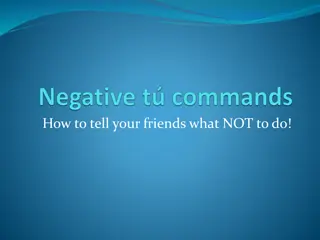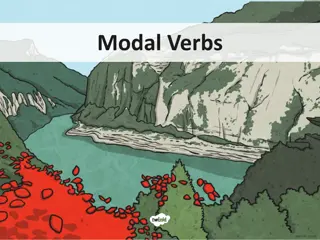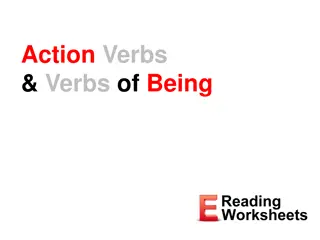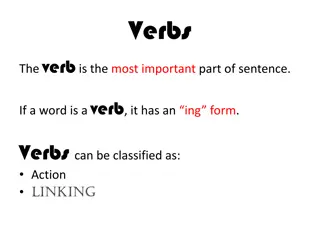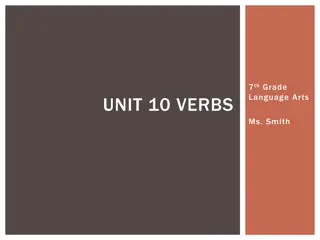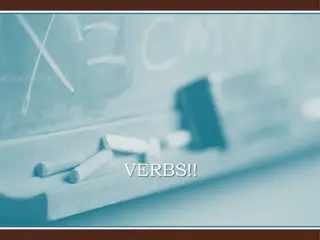Spanish Verbs and Opinions Task for Improvement
This independent study task focuses on improving Spanish language skills related to verbs and opinions. Students are required to translate sentences about personal information and express preferences using proper Spanish grammar and vocabulary. The task emphasizes correct usage of verbs in the 1st and 3rd person, as well as expressing opinions positively and negatively. By completing these exercises, students can enhance their proficiency in Spanish communication.
Download Presentation

Please find below an Image/Link to download the presentation.
The content on the website is provided AS IS for your information and personal use only. It may not be sold, licensed, or shared on other websites without obtaining consent from the author.If you encounter any issues during the download, it is possible that the publisher has removed the file from their server.
You are allowed to download the files provided on this website for personal or commercial use, subject to the condition that they are used lawfully. All files are the property of their respective owners.
The content on the website is provided AS IS for your information and personal use only. It may not be sold, licensed, or shared on other websites without obtaining consent from the author.
E N D
Presentation Transcript
Independent Study Spanish - Please complete ALL tasks which are attached to the back of your assessment in PURPLE PEN. You may write on the sheets. When you have finished the tasks, complete the Student Feedback comment in GREEN pen on the front of your assessment. Hand ALL assessments back to your form tutor at the end of the session INSIDE OF YOUR ASSESSMENT FOLDER. - - - Please Note: There are NO excuses for not completing your tasks in the time given in today s independent study session. Any students who fail to complete their tasks (due to lack of effort) will lose their club time on Friday and spend it with Mrs Reid completing it then. You will also receive 2 behaviour points for this. As your work is completely personalised for you, you should be working in complete silence as there is no need to confer with anyone else about your work.
Y8 The following sheets have been attached to the Y8 assessments
VERBS You have been given this task to do because you have made mistakes when using verbs in your Spanish assessment. Read the information below and then complete the task in PURPLE PEN. The following verbs are in the 1st person (talking about yourself): Me llamo = My name is Tengo = I have (tengo el pelo corto I have short hair, tengo los ojos azules I have blue eyes, tengo una hermana I have a sister) Vivo en = Soy = I am Mi cumplea os es.. = My birthday is The following verbs are in the 3rd person (talking about someone else): Se llama = his/her name is Tiene = he/she has (tiene el pelo corto he/she has short hair, tiene los ojos azules he / she has blue eyes, tiene una hermana he/she has a sister) Vive en = he/she lives in Es = he/she is Su cumplea os es = his /her birthday is Using the information given to you above. Translate the following sentences into Spanish: 1. My name is Maria. 2. He is called John. 3. I have blond hair. 4. She has blue eyes. 5. I live in England. 6. He lives in Madrid. 7. I am hardworking. 8. She is nice. My birthday is the 4th of July. 9. 10. His birthday is the 31st of October.
OPINIONS (1) You have been given this task to do because you have made mistakes when using opinions in your Spanish assessment. Read the information below CAREFULLY and then complete the task in PURPLE PEN. Positive: (1st person) Talking about yourself (3rd person) Talking about another person Me gusta = I like (singular) le gusta = he/she likes (singular) Me gustan = I like (plural) le gustan = he / she likes (plural) Me encanta = I love (singular) le encanta = he / she likes (singular) Me encantan = I love (plural) le encantan he / she likes (plural) Prefiero = I prefer (its my favourite) Prefiere = he / she prefers (its his/her favourite thing) Mucho = A lot Un poco = A little bit Negative: No le gusta = he / She doesn t like (singular) No le gustan = he / she doesn t like (plural) odia / detesta = he / she hates No me gusta = I don t like (singular) No me gustan = I don t like (plural) Odio / Detesto = I hate Definite Articles: A definite article is the word for the . In Spanish, when you say you like something, you need to include the definite article before the noun (the thing you like). For example: Me gusta el futbol = I like (the) football. The definite article will change depending on whether the noun (the thing you like) is masculine or feminine and if there is one or more than one of them. You can find out if a noun is masculine or feminine by finding it in a dictionary. There will be a (m) next to it if it s masculine, or a (f) next to it if it s feminine. Here are the definite articles in Spanish: Masculine: El (singluar) los (plural) Feminine: la (singular) las (plural) Using the information given to you above. Translate the following sentences into Spanish (you may use a dictionary): Example: I like chocolate (masculine,singular) = me gustael chocolate I like cats (masculine, plural) = me gustanlos gatos 1. I love Spanish* (masculine, singular) 2. I don t like pigs* (masculine, plural) 3. I prefer geography* (feminine, singular) 4. I hate fruit* (feminine, singular) 5. She doesn t like bananas* (masculine, plural) * Espanol = Spanish *cerdos=pigs *geografia = geography *fruta = fruit *platanos = bananas
OPINIONS (2) You have been given this task to do because you have made mistakes when using opinions in your Spanish assessment. Read the information below and then complete the task in PURPLE PEN. Giving a reason why. In Spanish, the word for because is porque . You will almost always follow this with either es (it is) or son (they are). For example: Me gustan los gatos porque son adorables = I like cats because they are cute. The word for cute is an adjective (a describing word). When using adjectives, you need to make sure their endings are correct. Their endings will depend upon the gender and amount of the noun (the thing) they are describing. In my example sentence, los gatos was masculine plural. This means that adorable needed to end in es (the masculine plural ending for adjectives ending in the letter e ). Look at the chart below for more details. Singular Bajo (short) Masculine: Plural If the adjective ends in the letter o it changes like this: Bajos Singular Feminine: Plural Baja Bajas Trabajador (hard-working) If the adjective ends in the letters or it changes like this: trabajadores trabajadora trabajadoras Interesante (interesting) If the adjective ends in the letter e it changes like this: interesantes interesante interesantes Using the information given to you above. Translate the following sentences into Spanish: (you may use a dictionary to help you) 1. I don t like pigsbecause they are fat 2. I love Spanish because it is interesting 3. I prefer geographybecause it is fun 4. I hate fruit because it is healthy 5. She doesn t like bananas because they are yellow
COMPARATIVES You have been given this task to do because you have made mistakes (or didn t attempt) using comparatives in your Spanish assessment. Read the information below and then complete the task in PURPLE PEN. Look at these examples: 1) Francia es mas grande que Espa a France is morebigthan Spain (France is bigger than Spain) 2) Espana es menosgrandeque Francia Spain is lessbigthan France (Spain is smaller than France) To create your own comparative sentences you just need to change the nouns (the things) and the adjectives (the describing words) 3) Irlandia es tangrandeque Escocia Ireland is asbigas Scotland Using the information given to you above. Translate the following sentences into Spanish (you may use a dictionary): 1. Mr Rea is taller* than Miss Butler 2. Mrs Reid is younger* than Mr Rea! 3. Mrs Arnold is as kind* as Mrs Kempson 4. Ingleby Manor is less boring* than Hogwarts 5. Spanish is as interesting* as Geography *alto/a = tall *joven = young *simpatico/a = kind *aburrido/a = boring *interesante = interesting
SUPERLATIVES You have been given this task to do because you have made mistakes (or didn t attempt) using SUPERLATIVES in your Spanish assessment. Read the information below and then complete the task in PURPLE PEN. Look at these examples: 1) Francia es el pais el mas grande France is the country the most big (France is the biggest country) 2) Espana es el pais el menos rico Spain is the country the least rich (Spain is poorest country) Using the information given to you above. Translate the following sentences into Spanish (you may use a dictionary): *Don t forget that the definite article (el/la) and the adjective (the describing word) need to agree with the gender of the noun (the thing). 1. Mr Rea is the *nicest teacher 2. Mrs Reid is the *coolest teacher 3. Mrs Arnold is the *tallest teacher 4. Ingleby Manor is the most *fun school 5. Spanish is the most *interesting subject *simpatico/a = nice *guay = cool *alto/a = tall *divertido/a = fun *interesante = interesting
ADJECTIVAL AGREEMENT / ENDINGS You have been given this task to do because you have made mistakes using ADJECTIVAL AGREEMENTS in your Spanish assessment. Read the information below and then complete the task in PURPLE PEN. When using adjectives in a sentence in Spanish, you need to consider how the ending is spelt. The ending will change depending on the noun it is describing. If the noun is masculine, generally the adjective will end in the letter o . If the adjective is feminine, generally the adjective will end in the letter a . There are exceptions to this rule. Look at the following grid, then complete the activity in PURPLE below. Masculine: Singular Bajo (short) Plural If the adjective ends in the letter o it changes like this: Bajos Feminine: Singular Plural Baja Bajas Trabajador (hard-working) If the adjective ends in the letters or it changes like this: trabajadores trabajadora trabajadoras Interesante (interesting) If the adjective ends in the letter e it changes like this: interesantes interesante interesantes Gender (m/f) Noun Adjective Plural / Singular M,P. EXAMPLE F,P unos comedores Ruidosos (ruidoso = noisy) modern____ (moderno = modern) antigu_____ (antiguo = old) limpi_____ (limpio = clean) bien equipad_____ una pista de atletismo F,P unas aulas F,S una cafeter a M,S un gimnasio viej_____ (viejo = old) tranquil_____ (tranquilo = old) climatizad_____ (climatizado = heated) M,P unos laboratorios F,S una sala de profesores F,S una piscina
MIXING TENSES You have been given this task to do because you needed to include a MIXTURE OF TENSES in your Spanish assessment. Read the information below and then complete the task in PURPLE PEN. Some irregular verbs in the past: Fui = I went Fue = he/she/it went Hice = I did Hizo = he/she/it did v I saw jugu I played com I ate beb I drank Terms to indicate time phrases: Future: Ma ana Tomorrow El ano que viene The coming year El pr ximo mes Next month En el futuro In the future Past: Ayer Yesterday El ano pasado last year El mes pasado last month La semana pasada last week Using the information given to you above, write a short paragraph which contains one action you (or someone else) did in the past and one that you are going to do in the future.
THE DEFINITE AND INDEFINITE ARTICLES You have been given this task to do because you made mistakes using the ARTICLES in your Spanish assessment. Read the information below and then complete the task in PURPLE PEN. The Definite Article = THE The Indefinite Article = A The two articles in Spanish change depending on whether the noun is: 1) Masculine/Feminine 2) Plural / singular Study the grid and then complete the table below in PURPLE PEN. THE A SOME Masculine El Un Unos Feminine La Una Unas Noun (m/f) The A Some Iglesia (f) La iglesia Una iglesia Unas iglesias Colegio (m) Biblioteca (f) Cine (m) Aeropuerto (m) Tienda (f) Museo (m)
POSSESSIVE PRONOUNS You have been given this task to do because you made mistakes using PRONOUNS in your Spanish assessment. Read the information below and then complete the task in PURPLE PEN. The Possessive Pronouns are: My Your His / Hers Their Study the grid and then complete the table below in PURPLE PEN. MY YOUR HIS/HER Singular Mi Tu Su Plural Mis Tus Sus Noun (m/f) My Your His/ Her hermana (s) Mi hermana Tu hermana Su hermana Nacionalidad (s) Padres (p) Perro (s) Hermanos (p) Plato (m) Zapatos (f)
CONNECTIVES You have been given this task to do because you made mistakes using (or didn t use) CONNECTIVES in your Spanish assessment. Read the information below and then complete the task in PURPLE PEN. Complete the following in PURPLE PEN: TASK Choose a suitable connective from the list below to link the ideas so that they make sense: pero but y and entonces therefore luego next porque because o or tambi n - also 1) Me llamo Jorge . vivo en Barcelona. My name is Jorge I live in Barcelona. 2) A las cinco voy a jugar al rugby. . a las siete voy a cenar. At 5 o clock I m going to play rugy . At 6 I m going for dinner. 3) No voy a Manchester no tengo dinero. I m not going to Manchester . I don t have money 4) Me gusta comer patatas fritas . me encanta beber zumo. I like to eat fries .. I love to drink juice 5) Me puedes comprar limonada .. Coca-Cola me gustan las dos. I can buy lemonade .. Coca-Cola I love them both. 6) Tengo 10 . puedo ir contigo a Manchester. I have 10 . I can go with you to Manchester. 7) S , mi madre tiene 60 a os . es muy fuerte. Yes, my Mum is 60 years old ..she is very strong.
Y7 The following sheets have been attached to the Y7 assessments
KEY PHRASES / PHRASAL STRUCTURES You have been given this task to do because you made mistakes using the KEY PHRASES in your Spanish assessment. Read the information below and then complete the task in PURPLE PEN. Me llamo . My name is Vivo en ... I live in .. Tengo . a os I am years old. Mi cumplea os es el .de .. My birthday is on the ..of Soy ingl s Soy inglesa I m English (boy) I m English (girl) Tengo un hermano Tengo una hermana I have a brother I have a sister Mi hermano se llama Mi hermana se llama My brother is called . My sister is called .. Soy hijo/a nico/a I m an only child Use the help grid above to write a short paragraph IN PURPLE PEN about yourself in Spanish. If there is one available, you can use a Spanish dictionary.
QUESTIONS You have been given this task to do because you made mistakes using the QUESTIONS in your Spanish assessment. Read the information below and then complete the task in PURPLE PEN. Look at the questions below: C mo te llamas? What is your name? Cu ntos anos tienes? How old are you? D nde vives? Where do you live? Cu ndo es tu cumplea os? When is your birthday? Tienes hermanos? Do you have brothers and/or sisters? C mo se llama tu hermano? C mo se llama tu hermana? What is your brother called? What is your sister called? Now look at the answers below: Me llamo . My name is Tengo . a os I am years old. Vivo en Inglaterra I live in England Mi cumplea os es el .de .. My birthday is on the ..of Tengo un hermano Tengo una hermana I have a brother I have a sister Mi hermano se llama Mi hermana se llama My brother is called . My sister is called .. Using your PURPLE PEN, circle the words that appear in both the question, AND the answer. The words can be just SIMILAR not exactly the same. I ve done the first one for you.
COUNTRY vs NATIONALITY You have been given this task to do because you made mistakes using the Countries and Nationalities in your Spanish assessment. Read the information below and then complete the task in PURPLE PEN. Los pa ses ( Los pa ses (Countries Countries) ) Country Nationality Vivo en I live in De d nde eres? Where are you from? Soy de . I am from La nacionalidad La nacionalidad ( (Nationality Nationality) ) Australia Australia Escocia Scotland Soy . I am.. Espa a Spain argentino/a Argentinian Francia France australiano/a Australian Alemania Germany chileno/a Chilean Italia Italy mexicano/a Mexican los Estados Unidos The United States nigeriano/a Nigerian Gales Wales Inglaterra England jamaicano/a Jamaican Irlanda Irland escoc s / escocesa Scottish M xico Mexico gal s / galesa Welsh Nigeria Nigeria ingl s /inglesa English Paquist n Pakistan irland s/irlandesa Irish Jamaica Jamaica franc s/francesa French Mozambique Mozambique espa ol /a Spanish frica del Sur South Africa alem n/a Germany Soy = I am Soy de = I am from estadounidense American Now, in PURPLE PEN: Write where you are from and what nationality You are. Remember, if you are a girl, you need to Change the end of your nationality to an a in some cases. paquistan Pakistani
DICTIONARY USE You have been given this task to do because you made mistakes using the Dictionary in your Spanish assessment. Read the information below and then complete the task in PURPLE PEN. DICTIONARY SKILLS Are these words Masculine or feminine? (m or f) Search for them in a bi-lingual Spanish dictionary then, with a PURPLE PEN, write down the answer in the space provided. 1) finger ____________________ 2) peach ____________________ 3) stress ____________________ 4) test (at school) ____________________ 5) direction ____________________ 6) code ____________________ 7) apple ____________________ 8) food ____________________ 9) petrol ____________________ 10) insect ____________________ 11) hospital ____________________ 12) pasta ____________________
SMALL BUT MIGHTY WORDS You have been given this task to do because you made mistakes using small words in your Spanish assessment. Read the information below and then complete the task in PURPLE PEN. The Definite Article = THE The Indefinite Article = A The two articles in Spanish change depending on whether the noun is: 1) Masculine/Feminine 2) Plural / singular Study the grid and then complete the table below in PURPLE PEN. THE A SOME Masculine El Un Unos Feminine La Una Unas Noun (m/f) The A Some ara a (f) La ara a Una ara a Unas ara as serpiente (m) alpaca (f) oso (m) perro (m) vicu a (f) gato (m)
